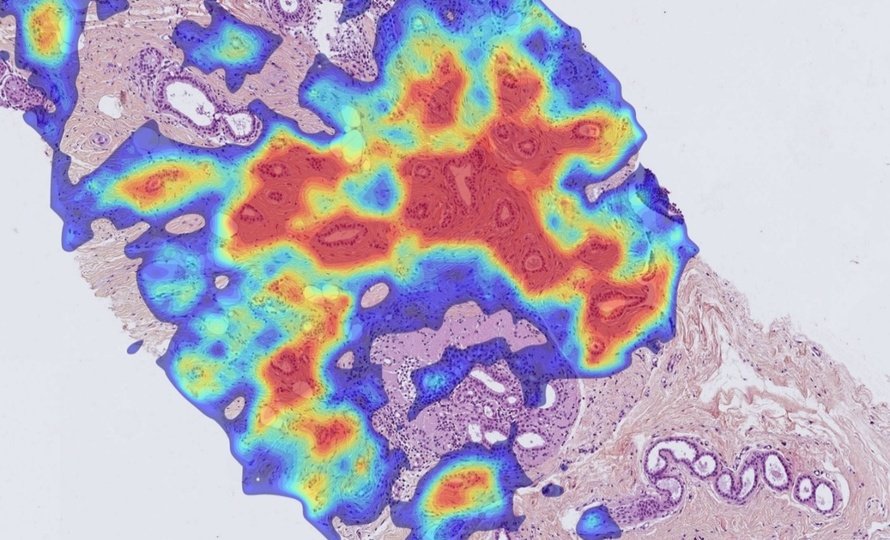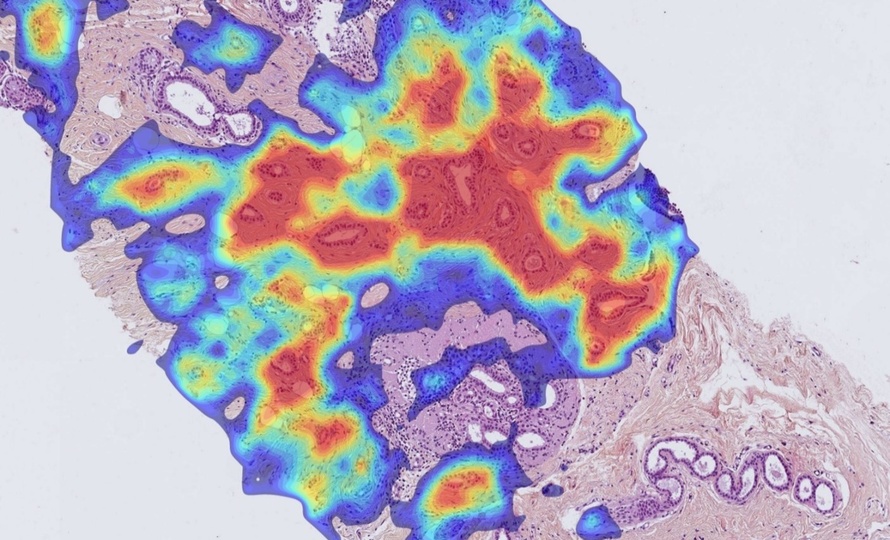BREAST CANCER DIAGNOSIS: IBEX ARTIFICIAL INTELLIGENCE SOON TO BE A CLINICAL REALITY AT INSTITUT CURIE


For the first time worldwide, an artificial intelligence (AI) tool is clinically validated for breast cancer diagnosis. Institut Curie and Ibex Medical Analytics, a pioneer in AI-based cancer diagnosis, demonstrate the performance, reliability and clinical application of an AI algorithm for breast biopsy diagnosis. These results were just published in the journal npj breast cancer.
"The results that have just been published suggest promising prospects both for the care of our patients and for the absolutely essential work of pathologists in cancer screening and diagnosis. Thanks to the validation of this Ibex AI tool, Institut Curie is taking another step towards implementing innovative and concrete responses to always better care for women with breast cancer."
rejoices Prof. Steven Le Gouill, director of Institut Curie Hospital Complex.
Led by Prof. Anne Vincent-Salomon of Institut Curie and Dr. Judith Sandbank of Maccabi Healthcare Services*, this study is the first to present an AI-based algorithm capable of accurately detecting such a wide range of clinically significant pathological features in breast biopsies. Furthermore, this work reports the first-ever implementation of such an AI solution in routine clinical use in a pathology laboratory. It thus demonstrates its utility as a decision support tool that allows pathologists to reduce diagnostic errors and improve diagnostic quality.
"This work shows that Ibex's Galen Breast has a consistently high performance. We are delighted with our collaboration with Ibex, which has allowed some pathologists at Institut Curie to gain first-hand experience with this AI tool. This study reveals the value to clinical practice of Galen Breast. Ultimately, it would allow us to optimize diagnoses, accelerate therapeutic decisions and, ultimately, improve the care of our patients."
said Prof. Anne Vincent-Salomon, head of the Department of Pathology at Institut Curie and professor at the Université Paris-Sciences et Lettres.
Breast cancer is the most common cancer among women worldwide, with more than 2.2 million new cases each year. Accurate and timely diagnosis is critical to guide treatment decisions by oncologists and improve patient survival rates. In recent years, rapid advances in personalized medicine have led to increasing complexity in cancer diagnosis. Due to the increase in the overall incidence of breast cancer and the decrease in the number of pathologists, the workload imposed on pathology departments has increased significantly. As a result, there is a growing need for automated solutions and decision support tools to help pathologists detect cancers more quickly and with greater accuracy.
Ibex has developed Galen Breast to help pathologists diagnose breast biopsies. This tool provides information that detects and evaluates the grade of different types of infiltrating and in situ breast cancer, as well as other pathological features. The solution's AI algorithm has been trained to identify more than 50 specific breast features, using deep-learning methods on hundreds of thousands of sample images.
"I was impressed with the results of the study, the very high levels of accuracy and the breadth of detection capabilities offered by Ibex's AI technology, similar to those of expert pathologists. I have had the pleasure of participating in the study and validation of new innovations that will reshape our profession for years to come, and I look forward to seeing other applications of AI become widespread in routine clinical use as they demonstrate their clinical validity."
said Stuart Schnitt, M.D., chief of breast oncology pathology at Dana-Farber/Brigham and Women's Cancer Center, professor of pathology at Harvard Medical School and co-author of the study.
"We are proud of the study results, which demonstrate the robustness of our algorithm for an unprecedented diversity of cancer types and other clinically important conditions. Detecting more than 50 breast morphological features makes the AI algorithm more comprehensive and accurate. As a result, Galen Breast has the ability to help pathologists with a wider range of tasks, as evidenced by the growing number of labs deploying the solution in routine use."
says Dr. Manuela Vecsler, director of clinical and scientific affairs at Ibex Medical Analytics.

